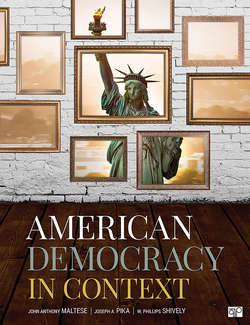Читать книгу American Democracy in Context - Joseph A. Pika - Страница 140
На сайте Литреса книга снята с продажи.
Libel and Slander
ОглавлениеThe First Amendment protects neither libel (written defamation of character) nor slander (spoken defamation of character), but the Supreme Court has set a high standard for government officials and other public figures who seek damages for defamation. In the landmark 1964 libel case, New York Times v. Sullivan, the Court held that public officials seeking damages for libel must prove not only that the statement is false and damaging but also that it was made with “actual malice”—that is, “made with knowledge that it was false or with reckless disregard of whether it was false or not.”62 In the absence of malice, falsity of the claim is not enough. Subsequent Supreme Court cases extended the actual malice standard to other public figures besides government officials.
Why such an exacting standard for public figures? President Trump, for one, has called the standard “a sham and a disgrace,”63 because it makes it more difficult for him and other public figures to sue, and other liberal democracies such as Canada and Germany have rejected such a high standard.64 But Justice Brennan, who wrote the opinion in New York Times v. Sullivan, defended it, arguing that there is a “profound national commitment” in the United States “to the principle that debate on public issues should be uninhibited, robust, and wide-open, and that it may well include vehement, caustic, and sometimes unpleasantly sharp attacks on government and public officials.”65 To allow anything less would interfere with a basic principle of the First Amendment: the free flow of ideas and opinion on matters related to the public interest. It could also interfere with the media’s ability to act as a government watchdog.
libel Written defamation of character, which is not accorded First Amendment protection.
slander Spoken defamation of character, which is not accorded First Amendment protection.
The actual malice standard makes it difficult but not impossible for public figures to win libel suits. Private figures who neither hold public office nor fall into the categories of celebrity that make an individual a public figure are not bound by the actual malice standard and may recover libel damages more easily. Whether one is a public or private figure, certain types of material are generally immune from libel charges. These include the publication of opinion as opposed to fact (such as a restaurant review) and parody (such as political cartoons).
